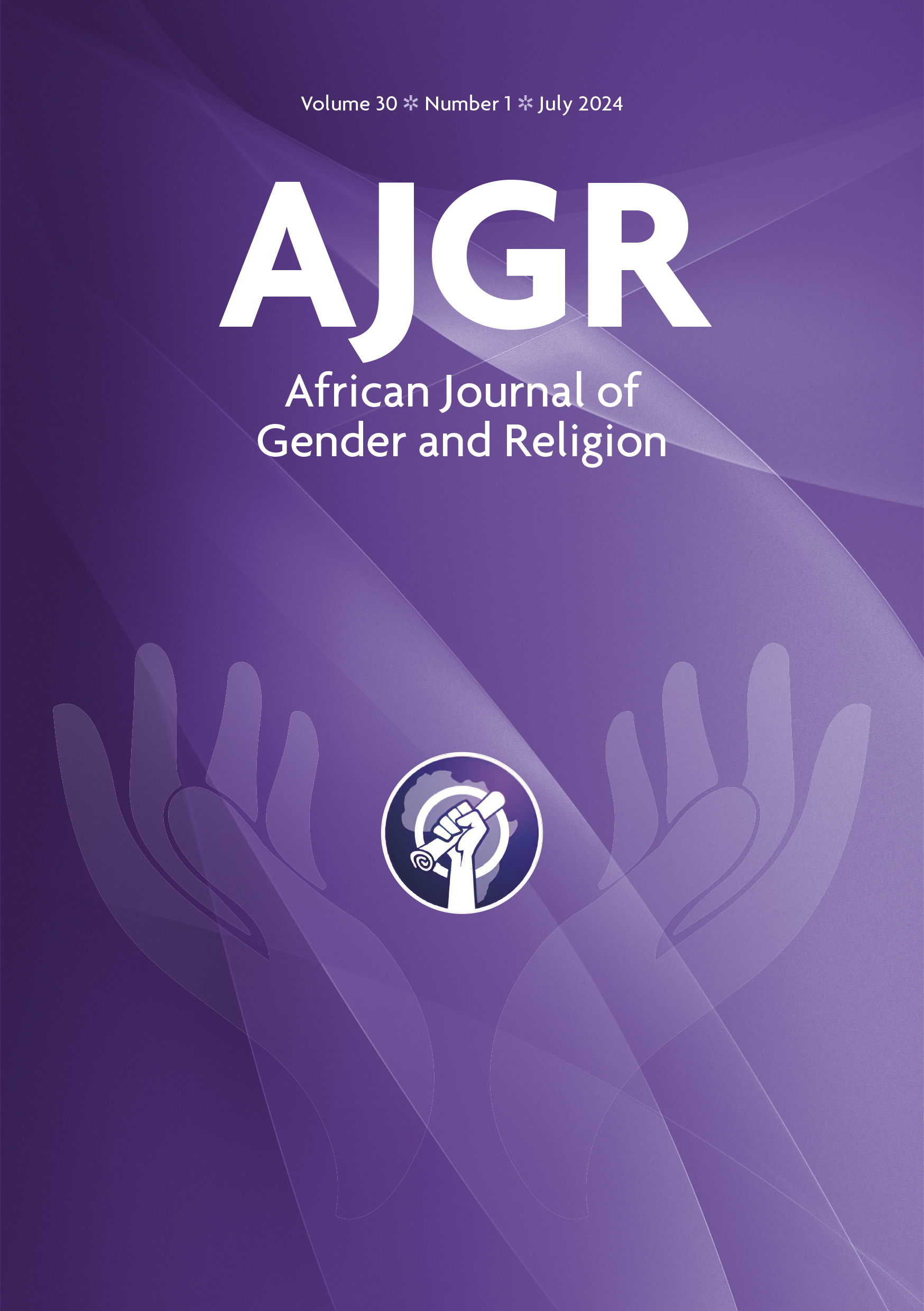Black Women’s Radical Religious Epistemologies in Mahogany and Steepled Towers
Main Article Content
Keywords
Abstract
The essays in this issue explore the diverse ways in which Black women’s religious epistemologies challenge conventional theological narratives. From the African spiritualities of Nigeria and Jamaica to the anti-colonial politics of Senegal, Sudan, and South Africa, the contributors offer a rich tapestry of perspectives highlighting the radical nature of Black women’s religious knowledge production. Weaving an eclectic spectrum of spiritual practices and beliefs, these essays offer the basis of radical religious epistemologies that enable Black women living under a range of circumstances, in several regions of the world, to find a pathway through the virulence they inhabit within their everyday lives.
Article Metrics Graph
Metrics
Metrics Loading ...
References
Bailey, Moya. Misogynoir Transformed: Black Women’s Digital Resistance. New York: New York University Press, 2021.
Beckles, Hilary M. and Verene A. Shepherd. Trading Souls: Europe's Transatlantic Trade in Africans. Kingston/Miami: Ian Randle Publishers, 2007.
Bolinger, Hope. “What is the Meaning of the Hebrew Word Ruach”, Christianity Today. Accessed July 28, 2024. https://www.christianity.com/wiki/christian-terms/what-is-the-meaning-of-the-hebrew-word-ruach.html#:~:text=If%20we%20understand%20the%20..
Cannon, Katie G. Black Womanist Ethics. New York: Oxford University Press, 1988.
Counted, Victor and Ibrahim Abraham. “Introduction to Religion and Spirituality in the African
Diaspora”. Journal for the Academic Study of Religion 34, no. 3 (2021). Accessed July 28, 2024. https://journals.equinoxpub.com/OLDJASR/article/view/43897
Crenshaw, Kimberle. “Mapping the Margins: Intersectionality, Identity Politics and Violence Against Women of Color”. Stanford Law Review 43, no. 6 (1991): 1241–1299.
Flaherty, Colleen “Faculties So White”, Inside Higher Education. Accessed July 28, 2024. https://www.insidehighered.com/news/2022/12/02/report-finds-faculty-diversity-isnt-meeting-student-needs
Foucault, Michel. Society Must Be Defended. New York: Picador, 2003.
Johnson, E. Patrick. “”Quare’ studies or (almost) everything I know about queer studies I learned from my grandmother”. Text and Performativity Quarterly 21, no. 1 (5 Nov 2010): 1–25.
Martos, Joseph. Doors to the Sacred: A Historical Introduction to Sacraments in the Catholic Church. Liguori: Ligouri Publications, 2001.
Nash, CL. “How Harriet Jacobs Reclaimed the Broken Body: Black Suffering, Black Redemption,” Mutuality Magazine, published July 5, 2021. Accessed July 28, 2024. https://www.cbeinternational.org/resource/how-harriet-jacobs-reclaimed-broken-body-Black-suffering/
Painter, Nell Irvin. “Why ‘White’ should be capitalized too”. Washington Post, July 22, 2020. Last accessed July 28, 2024. https://www.washingtonpost.com/opinions/2020/07/22/why-white-should-be-capitalized/
Thomas, Linda. “Womanist Theology, Epistemology, and a New Anthropological Paradigm”. Crosscurrents 48, no. 4 (1998/1999): 488–499.
Umeh, John Anenechukwu. The Igbo People: Their Origin and Culture Area. Enugu, Nigeria: Gostak Print. & Pub. Co., 1999.
Walker, Alice. 1983. In Search of Our Mothers’ Gardens, New York: Harcourt, Brace, Jovanovich, 1983.
Williams, Delores. Sisters in the Wilderness. Maryknoll, NY: Orbis Books, 1993.
Beckles, Hilary M. and Verene A. Shepherd. Trading Souls: Europe's Transatlantic Trade in Africans. Kingston/Miami: Ian Randle Publishers, 2007.
Bolinger, Hope. “What is the Meaning of the Hebrew Word Ruach”, Christianity Today. Accessed July 28, 2024. https://www.christianity.com/wiki/christian-terms/what-is-the-meaning-of-the-hebrew-word-ruach.html#:~:text=If%20we%20understand%20the%20..
Cannon, Katie G. Black Womanist Ethics. New York: Oxford University Press, 1988.
Counted, Victor and Ibrahim Abraham. “Introduction to Religion and Spirituality in the African
Diaspora”. Journal for the Academic Study of Religion 34, no. 3 (2021). Accessed July 28, 2024. https://journals.equinoxpub.com/OLDJASR/article/view/43897
Crenshaw, Kimberle. “Mapping the Margins: Intersectionality, Identity Politics and Violence Against Women of Color”. Stanford Law Review 43, no. 6 (1991): 1241–1299.
Flaherty, Colleen “Faculties So White”, Inside Higher Education. Accessed July 28, 2024. https://www.insidehighered.com/news/2022/12/02/report-finds-faculty-diversity-isnt-meeting-student-needs
Foucault, Michel. Society Must Be Defended. New York: Picador, 2003.
Johnson, E. Patrick. “”Quare’ studies or (almost) everything I know about queer studies I learned from my grandmother”. Text and Performativity Quarterly 21, no. 1 (5 Nov 2010): 1–25.
Martos, Joseph. Doors to the Sacred: A Historical Introduction to Sacraments in the Catholic Church. Liguori: Ligouri Publications, 2001.
Nash, CL. “How Harriet Jacobs Reclaimed the Broken Body: Black Suffering, Black Redemption,” Mutuality Magazine, published July 5, 2021. Accessed July 28, 2024. https://www.cbeinternational.org/resource/how-harriet-jacobs-reclaimed-broken-body-Black-suffering/
Painter, Nell Irvin. “Why ‘White’ should be capitalized too”. Washington Post, July 22, 2020. Last accessed July 28, 2024. https://www.washingtonpost.com/opinions/2020/07/22/why-white-should-be-capitalized/
Thomas, Linda. “Womanist Theology, Epistemology, and a New Anthropological Paradigm”. Crosscurrents 48, no. 4 (1998/1999): 488–499.
Umeh, John Anenechukwu. The Igbo People: Their Origin and Culture Area. Enugu, Nigeria: Gostak Print. & Pub. Co., 1999.
Walker, Alice. 1983. In Search of Our Mothers’ Gardens, New York: Harcourt, Brace, Jovanovich, 1983.
Williams, Delores. Sisters in the Wilderness. Maryknoll, NY: Orbis Books, 1993.


